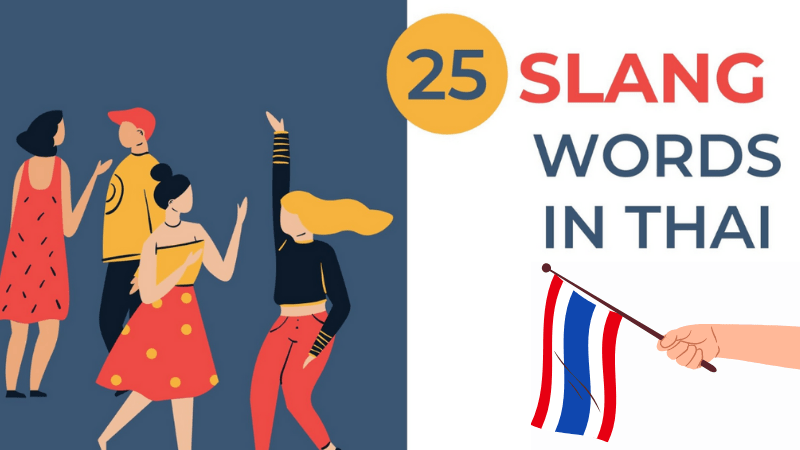Do you use slang?
Today I want to share with you how to use slang words in Thai, so you can sound like a local, even if you are not. Learning slang words in another language is always fun! It’s actually my favorite part of learning a new language. You can give the impression of being ahead of your language game with just a few clues. In addition, you will know what the people around you are up to or even what they are thinking about you if you know slang words in Thai. This can definitely be a game-changer if you use them right. So let’s get started!
Here Are The Top 25 Slang Words In Thai:
1) ฟาด (fâat) / Nailed It!
it is used by the younger Thai people in an approved manner.
A: วันนี้ชุดญาญ่าฟาดมาก
(Wanníi chút Yaya fâat mâak)
Today Yaya’s outfit really nailed it!
2) เริ่ด (rə̂rd) / Fabulous, Excellent
Something that เริ่ด (rə̂rd) is cool or awesome. You can use this word when your friends tell you a story and you want to reply that this is fabulous or cool.
A: ฉันเพิ่งจองตั๋วเครื่องบินไปกระบี่อาทิตย์หน้า
(Chǎn phə̂ŋ cɔɔŋ tǔa khrʉ̂aŋbin pay kràbìi aathít nâa)
I just booked my flight to go to Krabi next week.
B: เริ่ด (rə̂rd)
That’s fabulous!
3) มองบน (mɔɔŋ bon) / Roll Eyes
A: คนนี้ขี้โม้มากเลย มองบนแป๊บ
(Khon níi khîimóo mâak ləəy mɔɔŋ bon pɛ́p)
This person is definitely bragging! Let me roll my eyes real quick!
4) มันดีมากแม่ (man diimâak mɛ̂ɛ) / To Say Something Was Great
This is popular amongst girls to express something was awesome.
A: เมื่อวานฉันไปดำน้ำมา มันดีมากแม่
(Mʉ̂awaan chǎn pay damnáam maa man diimâak mɛ̂ɛ)
I went scuba diving yesterday. It was so awesome!
5) แบบจุกๆ (bɛ̀ɛp cùk cùk) / A lot, Big Amount
A: ร้านนี้ให้ข้าวแบบจุกๆ เลย
(Ráan níi hây khâaw bɛ̀ɛp cùk cùk ləəy)
This restaurant gives a lot of food.
6) เป็น(อะ)ไรมากป่ะ (pen (à) ray mâak pà) / What’s Wrong With You?
This one is used if you want to express somebody’s behavior annoyed you.
A: เมื่อคืนแฟนเก่าส่งข้อความมาหาฉันเยอะมาก
(Mʉ̂akhʉʉn fɛɛn kàw sòŋ khɔ̂ɔkhwaam maahǎa chǎn yə́ mâak)
My ex sent me a lot of texts last night.
B: (มัน)เป็นไรมากป่ะ
((Man) penray mâak pà)
What’s wrong with him?
7) อย่าหาทำ (yàa hǎa tham) / Don’t Try It, Don’t Think About It
This is used if you want to express to your friends to not do something
A: ฉันจะจีบนักแสดงคนนี้
(Chǎn cà cìip náksadɛɛŋ khon níi)
I’m going to flirt with this actor.
B: อย่าหาทำ (Yàa hǎa tham)
Don’t think about it!
8) ลำไย (lamyay) / Annoying
A: คนนั้นพูดมากจังเลย ลำไย
(Khon nán phûutmâak caŋ ləəy lamyay)
That person is talking too much! So annoying!
9) เท (thee) / Got Dumped, Got Ditched
You can use this one when you got dumped (from the relationship). Another situation is like when you and your friend agree to go out somewhere together, but you got ditched by your friend.
Situation 1 – A: เธอเทผมไปคบกับคนอื่น
(Thəə thee phǒm pay khóp kàp khonʉ̀ʉn)
She dumped me and dating another guy!
Situation 2 – A: เพื่อนเทฉันแล้วออกไปดูหนังกับแฟนแทน
(Phʉ̂an thee chǎn lɛ́ɛw ɔ̀ɔk pay duu nǎŋ kàp fɛɛn thɛɛn)
My friend ditched me and went to the movies with her boyfriend instead!
10) เจ้าชู้ (câawchúu) / Playboy
A câawchúu is a playboy. Depending on the context, it can be used as a joke, which is rarer, mostly it is meant as an insult.
A: อย่าไปยุ่งกับเขานะ เขาเจ้าชู้มาก
(Yàa pay yûŋ kàp khǎw ná khǎw câawchúu mâak)
Don’t mess with him. He is a playboy!
11) ปัง (paŋ) / Splendidly
This can be used as a compliment to someone.
A: วันนี้สวยปังมาก (Wanníi sǔay paŋ mâak)
Today you’re splendidly gorgeous.
12) กิ๊ก (gik) / Lover
Gig refers to a person’s casual lover. It can be used to refer to both men and women. In English, it would most likely be the equivalent to the term “friends with benefits”.
13) ติ๊งต๊อง (ting tóng) / Goofy
While baa is the proper word for crazy, ting tong is used in a jokier manner. It is typically used to indicate that someone is perceived as being a bit unusual or excentric.
A: คุณติ๊งต๊องจัง
(Khun ting tóng jang)
You’re so goofy!
14) ภาษาดอกไม้ (phaasǎa dɔ̀ɔkmáay) / Flower Language, Poetic
This one is a lovely Thai slang phrase, ‘phaasǎa dɔ̀ɔkmáay’ literally translates as ‘the flower language’. It’s very poetic, so if you hear somebody speaking phaasǎa dɔ̀ɔkmáay, they are using words of love and tenderness. Friends may, however, mock each other if they hear such dreamy and romantic lingo because it might emphasize someone is in love.
15) ไฮโซ (hay soo) / High Society, High-Class
High so, similar to high society in English is used in Thai when talking about somebody from the upper class. If your friends talk about a new venue that attracts lots of high so, you know it’s a fancy place with probably higher prices.
A: ดูคนนั้นสิ ไฮโซมากเลย
(duu khon nán sì hay soo mâak ləəy)
Look at that person, so high-class!
16) ส้มหล่น (sôm lòn) / How Lucky
A very poetical slang phrase, ‘sôm lòn’ literally means ‘an orange drops’, which in Thailand is a good thing if you catch it on the way down. Use this when you’ve had a bit of luck that you didn’t expect.
máw mɔɔy is a slang verb for gossiping. If you hear your Thai friends mentioning that someone likes to máw mɔɔy, you’d better keep your secrets from that person.
18) เก็ต (kèt) / I Get It
So this one is easy because it is like saying ‘I get it’, so when you understand what’s going on (not always easy in Thailand) but this is the word to use.
A: งานยุ่งมากจนไม่มีเวลาทำอะไรเลย เก็ตปะ
(ŋaan yûŋ mâak con mâymii weelaa tham àray ləəy kèt pà)
The work is so busy that I don’t have time to do anything. Do you get it?
B: เก็ต
(kèt)
I get it.
19) อิน (in) / Feeling Emotional
อิน (in) is used to describe an emotional feeling. For example, if you watch a movie or listen to a song that brings up emotions.
A: เพลงนี้เพราะ อินมาก
(phleeŋ níi phrɔ́ in mâak)
The song is good, made me emotional.
If somebody is said to be krɔ̀ɔp, you know that they do not have much money (or tang) and are struggling financially. The English equivalent to this is to be ‘broke’. Sometimes it is also used as an insult.
A: เดือนนี้กรอบมาก
(Dʉan níi krɔ̀ɔp mâak)
I’m so broke this month.
21) นอย (nɔɔy) / Paranoid, Anxious, Worried, To Feel Offended, To Upset
Similar to the English word paranoid it is used to describe feeling anxious.
A: เขาลืมวันเกิดฉัน ฉันนอยมาก
(Khǎw lʉʉm wankə̀ət chǎn chǎn nɔɔy mâak)
He forgot my birthday, I feel offended.
22) ดองงาน – (dɔɔŋ ŋaan) / Procrastinate On One’s Work, Pickling The Job
If you were supposed to finish something for work but invest time in other things because you don’t want to do it and you procrastinate it to the next day.
This is how giggling sounds to the Thai. It is used to describe something funny. So, when this is added at the ending of the sentence, it is meant to be taken not so seriously.
24) ชิมิ (chìmì) / Am I right?
Literally translated as ‘right?’ in the question sense (as in ‘am I right?’). ‘We’re getting one more beer, ‘chìmì?’ is a good example.
A: หมาฉันน่ารักชิมิ
(Mǎa chǎn nâarák chìmì)
My dog is cute, right?
25) ตั้ลล้าก (tân láak) / Cute
This is the shorter version of น่ารัก (nâarák) which means cute in Thai.
A: หมาตัวนี้ตั้ลล้าก
(mǎa tua níi tân láak)
This dog is cute.
Learn More Thai With Ling App!
Slang is mostly used by younger people. So be careful when using them, especially when you are talking to older or middle age, Thai people. If you use slang words you can surely impress Thai natives, but be careful to never use informal communication, especially in writing. Also, you have to remember that slang words for Thai people are a fashionable thing, they come and go. So if you can’t remember all the Thai words, don’t worry. Another great way to practice Thai words is with the Ling Thai app from Simya solutions. Take a few minutes to play through the different tests and challenges and you will learn Thai really fast and improve your skills.


































































